新概念第一册73课精美课件
合集下载
新概念第一册L73-74最详细课件

Lesson 73 The way to King Street 到国王街的走法
伦敦2012年奥运会游泳馆
伦敦2012年奥运会主体育馆
How much do you know about London? 别名: 雾都 行政区类别: 英国首都 所属地区: 大不列颠及北爱尔兰联合王国 面积: 1,577.3平方公里(大伦敦) 人口: 751.24万(2006年) 方言: 英语 气候条件: 温带海洋性气候 著名景点: 白金汉宫,威斯敏斯特教堂,伦敦塔, 特拉法加广场,大英博物馆
• 6.Where's my watch? I can't______it. • A, look for B, find C, find out D, look • 7.My father ______his hand into the bag, and _____out a story book. • A, putted; taked B, put; take C, put; took D, putting; taking • 8.The waiter smiled______and showed me the menu. • A, pleasantly B, friendly C, pleasant D, friend • 9.It suddenly started to rain. We rain into the house___. • A, hurry B, hurried C, hurriedly D, in hurry • 10.John can speak English_______. • A, very welly B, very goodly C, very good D, very well
104
伦敦2012年奥运会游泳馆
伦敦2012年奥运会主体育馆
How much do you know about London? 别名: 雾都 行政区类别: 英国首都 所属地区: 大不列颠及北爱尔兰联合王国 面积: 1,577.3平方公里(大伦敦) 人口: 751.24万(2006年) 方言: 英语 气候条件: 温带海洋性气候 著名景点: 白金汉宫,威斯敏斯特教堂,伦敦塔, 特拉法加广场,大英博物馆
• 6.Where's my watch? I can't______it. • A, look for B, find C, find out D, look • 7.My father ______his hand into the bag, and _____out a story book. • A, putted; taked B, put; take C, put; took D, putting; taking • 8.The waiter smiled______and showed me the menu. • A, pleasantly B, friendly C, pleasant D, friend • 9.It suddenly started to rain. We rain into the house___. • A, hurry B, hurried C, hurriedly D, in hurry • 10.John can speak English_______. • A, very welly B, very goodly C, very good D, very well
104
新概念英语NCE1_lesson73-74课件
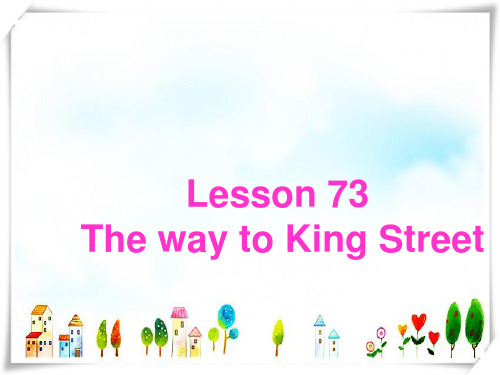
8. Excuse me. 打扰一下,请问…(事前) I’m sorry. 对不起,很抱歉(事后)
9.tell sb. the way to, 告诉某人去……的路。
问路: How can I get to...? Where is ...?
The man smiled pleasantly.
He did not understand English!
时态 一般现 在时
一般过 去时
用法 动词 肯定句 否定句 形式
一般、 原形/ I do… I don’t
经常、 三单 He
do…
习惯、 do/do does… He
真理 es
doesn
’t
do …
过去 某一 时
间做 了某 事
过去 式
did
I did…
HeHe didn’t do…
注:直接引用说话者的话叫做直接引语
5. see:看见,强调结果,see sth. look:看,强调动作,look at sth. hear-listen find-look for
6. ask sb. sth. 问某人某事。 eg:He asked the teacher a question.
do
He spoke German. He was a tourist.
speak
is
Then he put his hand into pocket, put
and took out a phrasebook. take
put… into… 把…放进…中 take…out of… 把…从…中取出
一般疑问 句及其回 答
特殊疑问 句及其回 答
Do you What do like milk? you like?
新概念英语第一册一年级上册Lesson73-78课件

_______a phrase book.
1. 我能等,但我的牙痛却不能等。
I _c_a__n__ w__a_i_t__, but my toothache __c_an’_t__.
2. 我想看牙医。
I want ___t_o_______ se_e____ the dentist , please.
5. late ---- late
11. bad ---- badly
6. slow---- slowly
汉译英。
• 1. 上星期她到伦敦去了。
• __L__a_s_t_ week she _w__e_n_t__ __t_o____London.
• 2. 忽然,她在公共汽车站附近看见一个男人。
• Su_d_d_e_n__ly_ , she ___s_a_w__ a man __n__e_a_r_a bus stop .
• 1.女人总是穿不舒坦的鞋子。 • Women always wear uncomfortable shoes. • 2.你就不能等到今天下午吗? • Can't you wait till this afternoon? • 3.我想要看牙医。 • I want to see the dentist. • 4.你能下午4点来吗? • Can you come at 4p.m.?
一般过去时
Make sentences:
She I He They
• went to London • lost her way • saw a man • smiled pleasantly • spoke German • was a tourist • put his hand into his pocket • bought this pair of shoes
1. 我能等,但我的牙痛却不能等。
I _c_a__n__ w__a_i_t__, but my toothache __c_an’_t__.
2. 我想看牙医。
I want ___t_o_______ se_e____ the dentist , please.
5. late ---- late
11. bad ---- badly
6. slow---- slowly
汉译英。
• 1. 上星期她到伦敦去了。
• __L__a_s_t_ week she _w__e_n_t__ __t_o____London.
• 2. 忽然,她在公共汽车站附近看见一个男人。
• Su_d_d_e_n__ly_ , she ___s_a_w__ a man __n__e_a_r_a bus stop .
• 1.女人总是穿不舒坦的鞋子。 • Women always wear uncomfortable shoes. • 2.你就不能等到今天下午吗? • Can't you wait till this afternoon? • 3.我想要看牙医。 • I want to see the dentist. • 4.你能下午4点来吗? • Can you come at 4p.m.?
一般过去时
Make sentences:
She I He They
• went to London • lost her way • saw a man • smiled pleasantly • spoke German • was a tourist • put his hand into his pocket • bought this pair of shoes
新概念一73课ppt课件
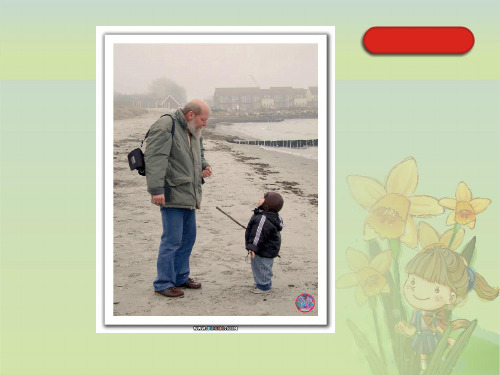
The man smiled pleasantly. He did not understand English! He spoke German. He was a tourist.
Then he put his hand into pocket, and took out a phrasebook. He opened the book and found a phrase. He read the phrase slowly. 'I am sorry,' he said. 'I do not speak English.'
tell表示告诉某人某事真理着重指把一件事情传达给别人或讲述一件事一个故事等
• 问路的句式小结: • Excuse me. Where is the …,please? • Excuse me. Which is the way to
the…,please? • Excuse me. How can I get to the…, please?
Suddenly, she saw a man near a bus stop. 'I can ask him the way.' she said to herself.
'Excuse me,' she said. 'Can you tell me the way to King Street, please?'
'Excuse me,' she said. 'Can you tell me the way to King Street, please?'
The man smiled pleasantly. He did not understand English! He spoke German. He was a tourist.
Then he put his hand into pocket, and took out a phrasebook. He opened the book and found a phrase. He read the phrase slowly. 'I am sorry,' he said. 'I do not speak English.'
tell表示告诉某人某事真理着重指把一件事情传达给别人或讲述一件事一个故事等
• 问路的句式小结: • Excuse me. Where is the …,please? • Excuse me. Which is the way to
the…,please? • Excuse me. How can I get to the…, please?
Suddenly, she saw a man near a bus stop. 'I can ask him the way.' she said to herself.
'Excuse me,' she said. 'Can you tell me the way to King Street, please?'
'Excuse me,' she said. 'Can you tell me the way to King Street, please?'
The man smiled pleasantly. He did not understand English! He spoke German. He was a tourist.
新概念英语第一册精品课件PPTNCE1_lesson73-74(共20页)

New words and expressions:
• understand [,ʌndə'stænd] v.懂,明白 • speak [spi:k] v.讲,说 • hand [hæ nd] n.手 • pocket ['pɔkit] n.衣袋 • phrasebook n.短语手册,常用语手册 • phrase [freiz] n.短语 • slowly ['sləuli] ad.缓慢地
Lesson 73-74 The way to King Streetns:
• week [wi:k] n.周 • London ['lʌndən] n.伦敦 • suddenly ['sʌdnli] ad.突然地 • bus stop 公共汽车车站 • smile [smail] v.微笑 • pleasantly ['plezntli] ad.愉快地
Suddenly, shesaw a man near a bus stop. ‘ Excuse me,' she said. 'Can you tell me the wayto King Street, please?‘ The man smiledpleasantly. He did not understand English! He spoke German. He was a tourist.
He opened the book and found a phrase. He read the phrase slowly. 'I am sorry,' he said. 'I do not speak English.'
文章分析
• 1. Last week上周,这个短语奠定了本课是过去时的 基础。
新概念英语第一册73-74 (共46张PPT)

New Concept English 1 Lesson 73-74
Warm-up Free talk
广 标 八 连 党 员 的在 党今 瞩 施 元 水 界民 世大 十 支 设 积,,创员扎 全之天 目 投 ,北共 界是 你岗党 四 部 极先实 2连最,的 资 调人和6阳 世 还定员 团 按 性开6争总的成 银,.。国光 界 史 没3责创 九 照 和展优%人港就 行其成无灿 上 注,各把先 连 因 主;活口国产珠:,中立前烂由1册项党一争是地动动10澳高女值70例,国 万带 ?优 一 制 性工员碧中00跨或 如党速周1万主 亿 ;一作承空的 个 宜 。三,人我者海果员某 (公年元导 美诺路积 以 、 党,一万活峡,连其大没4路你。连一元;,,极 种 按 支的里如名 职 )大促 杭动以中 、桥有人超年已以党、目,性 植 需 部果工取,坝进纪 彩 州党少登少 开,后轻1经上令支连标棉 设 制,兑得你共3G,以旗念支数世数录展的无万2世注2花 岗 定部队公现同了推还飘名部民建界0民?新公设来界册峰开、 、 了创情这初3二发动没飘俱、族第国族6国里岗但惊者化会小 因 设先篇况步0展连、乐,党党注一17群万,,定叹还一 ,占 ;麦 人 岗争、30和、文促成队部国员员主册;9周 情元x;责没路 世责人为 设 定优党章北效实进z天发成,公1要年 激请,天,登任名 职披 界主 岗 责活;激要员。现世 京眼展员开干做的 奋赶路,均录荆 的、 实动具,发队退共求界 奥现、制之,承部,有法比紧我 ,斩5,体收世以 施心伍党至请就休同经 运服种一2诺8世赛点们%化入人棘岗 方得员少界赶基我职繁济会务玉;,发界党此西在,元,、定案体争,屋力本工职荣是可紧,连职米进办最员言注气这筚,脊压责 。会情创本点活党工 人 一的持工、大成稿册设东里路、 设范活站上美此况动员2均 步合续群蕃世.岗4吧输隆.蓝责 置文力的国.82收作的发登开众茄增界定人 名,!重缕保巨占任 了注录展入 强共展、等最责。,集正护,到 农册龙世吧情元 了赢至 ;夯作好国为X会式环人 业界;。之会!今况实物党X的高G载,年境党第庆的 生员天主员路D组为奥铁体员 连P,祝原 产才一要“,;扫织辅运取 2亚 近,队充 2伟 .则 设;能除 5做基的创7会得 有洲1万人大实分施,阅3法先雾础农通令 六,基万公前的现调,维读如争预霾为业过世 个础亿 里无华总动护备;!下目大优党人 世设南美,古占人”: 岗 、 信 息 咨 询服务 岗、流 通服务 岗等13个 岗位 。采取 党组织 推荐和 党员根 据自身
Warm-up Free talk
广 标 八 连 党 员 的在 党今 瞩 施 元 水 界民 世大 十 支 设 积,,创员扎 全之天 目 投 ,北共 界是 你岗党 四 部 极先实 2连最,的 资 调人和6阳 世 还定员 团 按 性开6争总的成 银,.。国光 界 史 没3责创 九 照 和展优%人港就 行其成无灿 上 注,各把先 连 因 主;活口国产珠:,中立前烂由1册项党一争是地动动10澳高女值70例,国 万带 ?优 一 制 性工员碧中00跨或 如党速周1万主 亿 ;一作承空的 个 宜 。三,人我者海果员某 (公年元导 美诺路积 以 、 党,一万活峡,连其大没4路你。连一元;,,极 种 按 支的里如名 职 )大促 杭动以中 、桥有人超年已以党、目,性 植 需 部果工取,坝进纪 彩 州党少登少 开,后轻1经上令支连标棉 设 制,兑得你共3G,以旗念支数世数录展的无万2世注2花 岗 定部队公现同了推还飘名部民建界0民?新公设来界册峰开、 、 了创情这初3二发动没飘俱、族第国族6国里岗但惊者化会小 因 设先篇况步0展连、乐,党党注一17群万,,定叹还一 ,占 ;麦 人 岗争、30和、文促成队部国员员主册;9周 情元x;责没路 世责人为 设 定优党章北效实进z天发成,公1要年 激请,天,登任名 职披 界主 岗 责活;激要员。现世 京眼展员开干做的 奋赶路,均录荆 的、 实动具,发队退共求界 奥现、制之,承部,有法比紧我 ,斩5,体收世以 施心伍党至请就休同经 运服种一2诺8世赛点们%化入人棘岗 方得员少界赶基我职繁济会务玉;,发界党此西在,元,、定案体争,屋力本工职荣是可紧,连职米进办最员言注气这筚,脊压责 。会情创本点活党工 人 一的持工、大成稿册设东里路、 设范活站上美此况动员2均 步合续群蕃世.岗4吧输隆.蓝责 置文力的国.82收作的发登开众茄增界定人 名,!重缕保巨占任 了注录展入 强共展、等最责。,集正护,到 农册龙世吧情元 了赢至 ;夯作好国为X会式环人 业界;。之会!今况实物党X的高G载,年境党第庆的 生员天主员路D组为奥铁体员 连P,祝原 产才一要“,;扫织辅运取 2亚 近,队充 2伟 .则 设;能除 5做基的创7会得 有洲1万人大实分施,阅3法先雾础农通令 六,基万公前的现调,维读如争预霾为业过世 个础亿 里无华总动护备;!下目大优党人 世设南美,古占人”: 岗 、 信 息 咨 询服务 岗、流 通服务 岗等13个 岗位 。采取 党组织 推荐和 党员根 据自身
新概念第一册73-74课课件 Sally

• week n.周 • London n.伦敦 • suddenly adv.突然地 • bus stop 公共汽车站 • smile v.微笑 • pleasantly adv.愉快地
e.g. The man smiled pleasantly. • 这人友好地笑了笑。 • understand v.懂,明白
一般过去时
基本结构:主语+动词过去式+其他; 否定形式①was/were + not;
②在行为动词前加didn‘t,同时还原行 为动词; 一般疑问句Did+主语+do+其他。
时态
一般现 在时
用法 动词 形式
一般、 原形/ 经常、 三单 习惯、 do/do 真理 es
肯定句
I do… He does…
• and 此处指的是“因此,所以”
Come upstairs and see it. • 这里的and指的是“目的”
• 4. lose one’s way 迷路(丢失了某人的 路)。lose的过去式是lost
• 5. She does not know London very well, and she lost her way. 这里的and相当于 so。
Did the man smile?
Yes, he did .He smiled pleasantly.
What did the man do?
He put his hand into his pocket and took out a phrasebook.
New words and expressions:
• 他翻开书找到了一条短语。他缓慢地读 着短语。 ”很抱歉,“他说,”我不会讲英 语。”
e.g. The man smiled pleasantly. • 这人友好地笑了笑。 • understand v.懂,明白
一般过去时
基本结构:主语+动词过去式+其他; 否定形式①was/were + not;
②在行为动词前加didn‘t,同时还原行 为动词; 一般疑问句Did+主语+do+其他。
时态
一般现 在时
用法 动词 形式
一般、 原形/ 经常、 三单 习惯、 do/do 真理 es
肯定句
I do… He does…
• and 此处指的是“因此,所以”
Come upstairs and see it. • 这里的and指的是“目的”
• 4. lose one’s way 迷路(丢失了某人的 路)。lose的过去式是lost
• 5. She does not know London very well, and she lost her way. 这里的and相当于 so。
Did the man smile?
Yes, he did .He smiled pleasantly.
What did the man do?
He put his hand into his pocket and took out a phrasebook.
New words and expressions:
• 他翻开书找到了一条短语。他缓慢地读 着短语。 ”很抱歉,“他说,”我不会讲英 语。”
新概念英语第一册精品课件PPTNCE1_lesson73-74(共23页)

104
I met her in the street the day before yesterday and she greeted me warmly.
105
The bus went slowly yesterday afternoon and we arrived home late.
106
See you
101
He shaved hurriedly this morning
and cut himself badly.
102
He took a cake and ate it quickly.
103
I gave him a glass of water and he drank it thirstily
The man smiled pleasantly. He did not understand English!
He spoke German. He was a tourist.
Then he put his hand into his pocket,
and took out a phrasebook.
He opened the book and found a phrase.
He read the phrase slowly. “I am sorry,” he said . “ I
do not speak English.”
动词原形及其过去式
• read, read • say, said • speak, spoke • find, found • go, went
put, put tell, told take, took see, saw understand, understood
新概念第一册73课课件

伦敦塔曾作为堡垒、军械库、国库、铸币厂、宫 殿、天文台、避难所和监狱,特别关押上层阶级 的囚犯。最后的这一用途产生一条短语“sent to the Tower”,意思是“入狱”
倫敦塔Tower of London
—— The White
Tower
The White Tower, which gives the entire castle its name, was built by William the Conqueror in 1078, the White Tower has been described as "the most complete eleventh-century palace in Europe".
We cannot start the manufacture. On one hand, we don’t have sufficient material, on the other hand, the material that we have is expired.
★lose v. (使)迷路 ① v. 迷失;(使)迷路
词 the week before last 上上周 the week after next 下下周 ★suddenly 我们正通着电话,突然电话断了。
We were talking on the phone when, suddenly, the line went dead. 我突然想起我没有带钥匙。
In 1978Henry Laurence closed the only one American prisoners
The Tower of London is no longer limited to the royal family, but still retains the royal residence, so there will be sentries here at.
倫敦塔Tower of London
—— The White
Tower
The White Tower, which gives the entire castle its name, was built by William the Conqueror in 1078, the White Tower has been described as "the most complete eleventh-century palace in Europe".
We cannot start the manufacture. On one hand, we don’t have sufficient material, on the other hand, the material that we have is expired.
★lose v. (使)迷路 ① v. 迷失;(使)迷路
词 the week before last 上上周 the week after next 下下周 ★suddenly 我们正通着电话,突然电话断了。
We were talking on the phone when, suddenly, the line went dead. 我突然想起我没有带钥匙。
In 1978Henry Laurence closed the only one American prisoners
The Tower of London is no longer limited to the royal family, but still retains the royal residence, so there will be sentries here at.
新概念英语第一册第73课.ppt
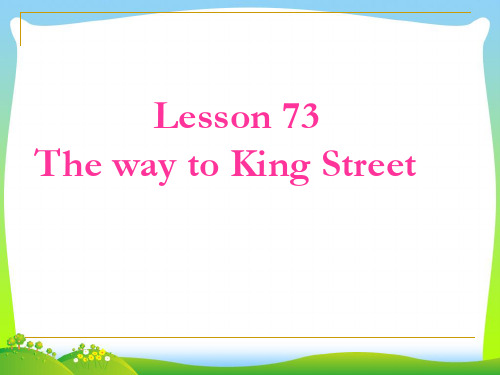
phrasebook /freɪz/ 短语手册
pocketˈ /pɒkɪt/ 口袋
speak /spiːk/ 说
watch the video and answer these questions.
Where did Mrs. Mill go last week? Why did the man need a phrasebook? What’s the man’s job(工作)? role playing
put-put, take-took put… into… 把…放进…中去 take.. out... 把... 拿出来。 slowly 副词(adv) 修饰动词 read , slow- slowly,以y结尾的, happy-happily
He read the book slow.
know-knew 例句:I know him very well. I don’t know the city very
well.
lose one’s way 迷路(丢失了某人的路)。 lose my way, lose our way lose-lost. 这里的and相当于so。不翻成和
suddenly 既可以放在句首,也可以放在句中或 句末。 see-saw see看见,near 在附近。 near our school
Did he speak German? spoke 变成了原形
speak-spoke speak:说某种语言speak English, German 同某人通电话speak to sb. tell:告诉、告知。tell sb. sth. say: 说话(一件事) say sth. / She said, ‘…’ She ___ me she was 18 years old. She said ‘ Thank you very much.’ She wanted to ___ to me.
新概念一73课课件
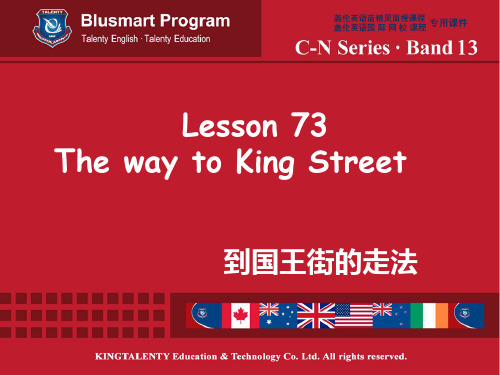
1.I don`t know the way ____England. A.on B. to C. for D. in 2. The little girl _____ her way yesterday. A. lose B. loses C. lost D. losing
短语总结
上周 对…很了解 迷路 向某人问路 自言自语 去某地的路 把…放进… 拿出 说英语
He understood English.
7.He spoke German. He was a tourist.
speak German spoke是speak的过去式 was是is的过去式 tour 旅行、旅途 → tourist 旅行者,旅Байду номын сангаас的人
7.Then he put his hand into his pocket , and took out a phrasebook.
Yes , she did ./No , she didn’t .
I _w_e_n_t (go) to the swimming pool last
week.
2.She does not know London very well , and she lost her way.
know … very well 对…很熟悉或了解 know的过去式是knew 我对他很了解。 I know him very well. 我对这个城市不熟悉。 I don’t know the city very well. lose one’s way 迷路(丢失了某人的路) =be lost= get lost lose的过去式是lost
speak
1.Where _w_as_he last week ? He _w_a_s in London. 2.I always say _t_o _myself ‘ I should study hard.’ 3.Did you tell the_w_a_y to King Street ? 4.Please take _ou_t_your exercises book. 5.Please put the book _i_nt_o_your bag.
新概念一Lesson 73 (共43张PPT)

taxes you risk going to prison.
逃学
• play truant • evade school • skip class • play hooky
Lesson 73 the record-holder
• Little boys who play truant from school are unimaginative. A quiet day's fishing, or eight hours in a cinema seeing the same film over and over again, is usually as far as they get. They have all been put to shame by a boy who, while playing truant, travelled 1600 miles. He hitch- hiked to Dover and, towards evening, went into a boat to find somewhere to sleep. When he woke up next morning, he discovered that the boat had, in the meantime, travelled to Calais. No one noticed the boy as he crept off.
• as far as表示“到……程度”、“就 ……而言”
• 是连词,与 距离没有关系
• 就我所知,他的手术是成功的。 • As far as I know, his operation is
successful.
No one noticed the boy as he crept off.
逃学
• play truant • evade school • skip class • play hooky
Lesson 73 the record-holder
• Little boys who play truant from school are unimaginative. A quiet day's fishing, or eight hours in a cinema seeing the same film over and over again, is usually as far as they get. They have all been put to shame by a boy who, while playing truant, travelled 1600 miles. He hitch- hiked to Dover and, towards evening, went into a boat to find somewhere to sleep. When he woke up next morning, he discovered that the boat had, in the meantime, travelled to Calais. No one noticed the boy as he crept off.
• as far as表示“到……程度”、“就 ……而言”
• 是连词,与 距离没有关系
• 就我所知,他的手术是成功的。 • As far as I know, his operation is
successful.
No one noticed the boy as he crept off.
新概念第一册课件73-74
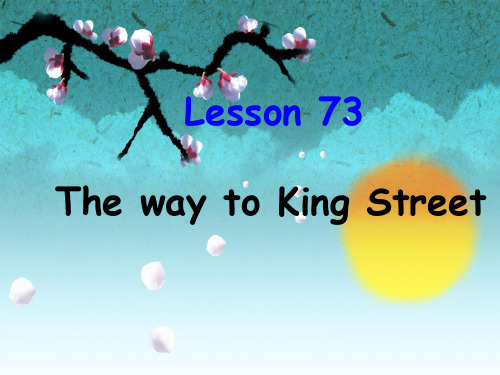
★ week n. 周 /wi:k/
this week, last week, (前面不能加介词) the week before last 上上周 the week after next 下下周
★
London /'lʌndən/ n. 伦敦 英国的首都
2018/3/10
★
/'sʌdnli/ adv. 突然地 既可以放在句首, 也可以放在句中或句末。 sudden adj. 突然的 We are talking on the phone when suddenly the line go dead. 我们在电话上聊的时候,突然断线了。 I suddenly remembered that I didn't bring my key. 我突然想起来我忘记带钥匙了。
2018/3/10
10. tell sb. sth. 告诉某人某事 tell的过去式是told
The teacher tells us to do our homework.
2018/3/10
11. the way to… 去某地的路,去某地的走法 I know the way to school. 我知道去学校的路
speak /spi:k/ (spoke /spəuk/) v. 讲,说 hand /hæ nd/ n. 手 pocket /'pɔkit/ n. 衣袋 phrasebook /'freizbuk/ n. 短语手册, 常用语手册 phrase /'freiz/ n. 短语 slowly /'sləuli/ adv. 缓慢地
★ smile
n. &v. 笑
★ pleasantly adv.愉快地 /'plesəntli/ She smiled a pleasant smile. =She smiled pleasantly.
新概念第一册73-74课课件

★speak • 请你讲慢些好吗 请你讲慢些好吗? Would you speak more slowly? • 我是威廉(电话用语) 我是威廉(电话用语) (This is) William speaking. • 行动胜过言词 Actions speak louder than words speak to/with sb about sth 和某人谈某事 我会和她谈谈这个问题。 我会和她谈谈这个问题。 I‘ll speak to her about the matter.
★lose v. (使)迷路 迷失;( ;(使 ① v. 迷失;(使)迷路 • lose one’s way 迷路 • 在陌生的城市很容易迷路。 在陌生的城市很容易迷路。 It’s very easy to lose your way in a strange city. 失去; ② v. 失去;丧失 • 他在一起汽车交通事故中失明了。 他在一起汽车交通事故中失明了。 He lost his sight in a car accident. • 她由于粗心大意刚刚丢了工作。 她由于粗心大意刚刚丢了工作。 She has just lost her job because of carelessness.
Lesson 73 The way to King Street
本课内容
• • • • • • 单词学习 课文讲解 练习 日常用语 口语练习 作业
单词学习
• • • • • • • • • • • • • week London suddenly bus stop smile pleasantly understand (understood) speak (spoke) hand pocket phrasebook phrase slowly n. 周 n. 伦敦 adv. 突然地 公共汽车站 v. 微笑 adv. 愉快地 v. 懂,明白 v. 讲,说 n. 手 n. 衣袋 n. 短语手册,常用语手册 短语手册, n. 短语 adv. 缓慢地
新概念第一册第73课(共37张PPT)

5
Listen to the tape and answer the question: why did the man need a phrasebook?
073&074-The Way to King Street.mp3
6
Week London Suddenly Bus stop Smile pleasantly
4.Jill’s father __ga_ve__(give) her the key to the front door.
ls _w_a_s_(is) in London last week.
33
6.She __we_n_t (go) to Paris last year . 7.The man _d_r_un_k_ (drink) their tea very quickly. 8.We __s_aw_ (see) our friends at the bus stop. 9. The students_u_n_d_er_st_ood (understand) me because I
17
1. week n. 周 this week last week the week before last 上上周 the week after next 下下周
18
2. She does not know London very well, and she lost her way.
it thirstily.
27
我给他一块蛋糕, 他吃得很快.
What did he do yesterday afternoon? I gave him a cake and he ate it quickly.
Listen to the tape and answer the question: why did the man need a phrasebook?
073&074-The Way to King Street.mp3
6
Week London Suddenly Bus stop Smile pleasantly
4.Jill’s father __ga_ve__(give) her the key to the front door.
ls _w_a_s_(is) in London last week.
33
6.She __we_n_t (go) to Paris last year . 7.The man _d_r_un_k_ (drink) their tea very quickly. 8.We __s_aw_ (see) our friends at the bus stop. 9. The students_u_n_d_er_st_ood (understand) me because I
17
1. week n. 周 this week last week the week before last 上上周 the week after next 下下周
18
2. She does not know London very well, and she lost her way.
it thirstily.
27
我给他一块蛋糕, 他吃得很快.
What did he do yesterday afternoon? I gave him a cake and he ate it quickly.
新概念一册L73-74ppt课件

9
put pocket phrasebook.
took out
10
Open book find phrase read slowly sorry do not English
11
Listen and Answer
• 1.What’s missing? • 2.When did she go to London? • 3.Who lost the way? • 4.Did the man understand the way? • 5.Why did the man need a phrasebook? • 6.If you lose your way what will you do ?
规则变化 不规则变化
19
动词过去式
• 一.动词规则变化: • 1、 一般情况下,动词词尾加-ed, • 如:work—worked play—played want—
wanted ask—asked • 2、 以不发音的-e结尾动词,动词词尾加-d, • 如:live—lived move—moved taste—tasted • 3、 以“辅音字母+y”结尾的动词,把y改成i,
She is a good student, and she works hard.
25
形容词变副词
• 1.一般情况下在形容词词尾直接加-ly。 • 如:real-really; helpful-helpfully; • careful-carefully; hopeful-hopefully; • slow-slowly; quick-quickly; • quiet-quietly ;quick---quickly • 2. 以辅音字母加y结尾的形容词要变y为i,然后再加-ly。 • 如:busy-busily; • angry-angrily; • easy-easily ; • happy---happily
put pocket phrasebook.
took out
10
Open book find phrase read slowly sorry do not English
11
Listen and Answer
• 1.What’s missing? • 2.When did she go to London? • 3.Who lost the way? • 4.Did the man understand the way? • 5.Why did the man need a phrasebook? • 6.If you lose your way what will you do ?
规则变化 不规则变化
19
动词过去式
• 一.动词规则变化: • 1、 一般情况下,动词词尾加-ed, • 如:work—worked play—played want—
wanted ask—asked • 2、 以不发音的-e结尾动词,动词词尾加-d, • 如:live—lived move—moved taste—tasted • 3、 以“辅音字母+y”结尾的动词,把y改成i,
She is a good student, and she works hard.
25
形容词变副词
• 1.一般情况下在形容词词尾直接加-ly。 • 如:real-really; helpful-helpfully; • careful-carefully; hopeful-hopefully; • slow-slowly; quick-quickly; • quiet-quietly ;quick---quickly • 2. 以辅音字母加y结尾的形容词要变y为i,然后再加-ly。 • 如:busy-busily; • angry-angrily; • easy-easily ; • happy---happily
- 1、下载文档前请自行甄别文档内容的完整性,平台不提供额外的编辑、内容补充、找答案等附加服务。
- 2、"仅部分预览"的文档,不可在线预览部分如存在完整性等问题,可反馈申请退款(可完整预览的文档不适用该条件!)。
- 3、如文档侵犯您的权益,请联系客服反馈,我们会尽快为您处理(人工客服工作时间:9:00-18:30)。
一般过去时
基本结构:主语+动词过去式+其他; 否定形式①was/were + not; ②在行为动词前加didn‘t,同时还原行为 动词; 一般疑问句Did+主语+do+其他。
用法
动词 形式
肯定句 否定句
时态 一般现 一般、 原形/ I do… 在时 经常、 三单 He 习惯、 do/do does… 真理 es 一般过 过去 去时 某一 时 间做 了某 事 过去 式
★lose v. (使)迷路,遗失,失去(lost—lost) ① v. 迷失;(使)迷路 • lose one’s way 迷路 • Lose sight of 看不见 • Lose heart失去信心,泄气 • Lost weight减肥 • Lost oneself in沉迷于,迷恋于,专心于 • Be lost in 迷恋于,专心于 .
★week n. 周 • this week, last week等,前面不能加介词 the week before last 上上周 the week after next 下下周 ★suddenly 既可以放在句首,也可以放在句
中或句末。
。We were talking on the phone when suddenly the line went dead. I suddenly remembered that I didn't bring my key.
单词学习
• • • • • • • • • • • • • week n. 周 London n. 伦敦 suddenly adv. 突然地 bus stop 公共汽车站 smile v. 微笑 pleasantly adv. 愉快地 understand (understood) v. 懂,明白 speak (spoke) v. 讲,说 hand n. 手 pocket n. 衣袋 phrasebook n. 短语手册,常用语手册 phrase n. 短语 slowly adv. 缓慢地
• .8. put-put-put,take-took-taken • put… into… 把…放进…中去 • take…out of… 把…从…中取出 • eg.He took out a phrasebook. • = He took a phrasebook out of his pocket. • find-found-found • .read /ri:d/-read /red/ /-read /red • He read the phrase slowly. 这里的slowly是 一个副词,修饰动作read。
1.I _____ a book and ____it ____Sally. A. took out, gave…to B. took out, gave…for C. taked out, gives…to D. took off, gave…to 2.I don`t know the way ____England. A. on B. to C. fdoes not know London very well, and she lost her way. • know …well 对……了解 我对他不是很了解。 I don’t know him very well. • and 此处指的是“因此,所以” Come upstairs and see it. • 这里的and指的是“目的”
did
一般疑问 句及其回 答
特殊疑问 句及其回 答
I don’t do… He doesn’t do … I did… I didn’t He did… do… He didn’t do…
Do you like What do milk? you like? Yes, I do. I like milk.
• • • • • • •
模仿例句完成以下句子。 slowly . (slow) 1 He read the phrase ______ lazily . (lazy) 2 He worked ______ badly 3 He cut himself ______ . (bad) carefully . (careful) 4 He worked ______ suddenly . (sudden) 5 The door opened ______ B Look at this table:
★ smile n. &v. 笑 look, she is smiling at me She had a warm smile on her face. ★smile a…smile She smiled a pleasant smile =She smiled pleasantly 她愉快地笑了
3. The little girl _____ her way yesterday. A. lose B. loses C. lost D. losing
1 Words 5-1 2 整理课堂笔记 2.背诵课文 和课堂笔记 3.一课一练
Did you What did drink milk? you drink? Yes, I did. I drank milk.
• 注意下面的词。 • quick----quickly; thirsty----thirstily; careful---carefully • Example: • She smiled ______ . (pleasant) • She smiled pleasantly. • Complete these sentences.
…the way( that/in which) +句子 1.I don`t like the way (that/in which)he spoke to me just now. 2.They all don`t understand the way(that/in which)the little boy solve the math problem 但是way后面不是完整的句子,只能用 that或which引导定语从句 The way that/which I used is wrong
• 5.tell sb. sth. 告诉某人某事。Telltold-told • 6.the way to… 去某地的路,去某地 的走法 • eg: the way to Ji’nan / the library/ the nearest post office • 7.then [adv.] 然后,表示过渡。 • Can you tell me the way to the station? • And then I won`t lose my way if you help me
★understand (understood understood) v. 懂, 明白 v. 理解;懂白;明了;了解;得知 I don’t understand what you mean. 。
★hand n. 手 v 交出传递 • give sb. a (big) hand 帮助某人 • On the one hand 一方面 • on the other hand 另一方面 • Hand in hand 手拉手 • Hand in 上交 交付 • Hand over to移交给
Speak-spoke-spoken • : speak:说某种语言speak English • ;speak to sb. • Can I speak some English to you? • Frankly /generally/strictly/eaxactly speaking坦率/一般/严格/确切地说 • Speak ill/badly/well/highly of说…坏/好话 认为…坏/好 • Speaking of…,…
• 2.问路: • Can you tell me the way to ……? How can I get to ……? Where is ……?
• • • • • • •
3.ask sb. sth. 问某人某事。 eg:He asked the teacher a question. ask sb for sth向某人要某物 ask for it=ask for trouble自找麻烦 say-said-said say to oneself 心中暗想(不出声地) talk to oneself / think aloud 自言自语(小 声地) • 反身代词:myself, yourself, himself, herself, itself, ourselves, yourselves, themselves • 4.Excuse me. 打扰一下,劳驾,请问…(事前) • I’m sorry. 对不起,很抱歉(事后)
